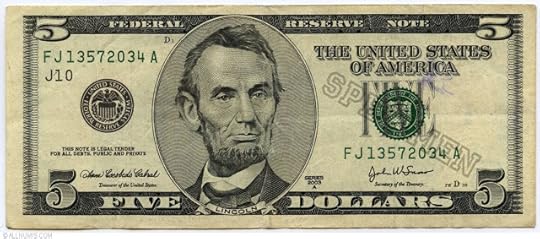Why Abraham Lincoln Should Be Removed From The Five Dollar Bill by Charles Bane, Jr.
 A woman on the $10 bill; sentiment to remove Andrew Jackson from the $20 bill. Poet Charles Bane, Jr. asks, why not take the so called "emancipator" Abraham Lincoln off the $5 bill?
A woman on the $10 bill; sentiment to remove Andrew Jackson from the $20 bill. Poet Charles Bane, Jr. asks, why not take the so called "emancipator" Abraham Lincoln off the $5 bill? Why Abraham Lincoln Should Be Removed From The Five Dollar Billby Charles Bane, Jr. | special to NewBlackMan (in Exile)
At his death, my late father was the nation's leading authority on Lincoln and the law. I revered my father and was awed by his intellect: he was a Rhodes Scholar , a graduate of Harvard Law, and senior partner at Isham, Lincoln and Beale, the firm founded by Abraham Lincoln's surviving child, Robert Todd Lincoln. From my earliest childhood, we were not father and son, but best friends. But he was my father, and I would no more correct a core principle he held closely than rob a bank.
At his retirement, we planned to write together the book he was born to write: a legal biography of the 16th President. We had uncovered new source material to add to the canon: only Jesus of Nazareth has more biographies devoted to him than Abraham Lincoln.
But today, I realize that the unfinished project was a secret blessing, halted by my father's death at eighty-four. I gave his eulogy, and quoted Lincoln, for from my father's company, I was "loathe to close". But my father upheld that Lincoln's view of African Americans was revolutionary, benign and humane, and I know this is not true.
This is a year of symbology: the confederate flag, which was never the banner of the Confederacy but served a post-war purpose as the flag of domestic terrorism by white supremacists was lowered from the capitol grounds in South Carolina. The current Treasury Secretary has announced that a woman will be featured on the ten dollar bill, and there is a strong movement to instead remove the dismal Andrew Jackson from the twenty dollar bill.
The record of Abraham Lincoln's racism is everywhere, like the traffic of animal tracks in his native Kentucky. Never, my father had said, would I ask a witness a question if I didn't already know the answer, and Lincoln answers history's question:
“I will say then that I am not, nor ever have been in favor of bringing about in anyway the social and political equality of the white and black races – that I am not nor ever have been in favor of making voters or jurors of negroes, nor of qualifying them to hold office, nor to intermarry with white people; and I will say in addition to this that there is a physical difference between the white and black races which I believe will forever forbid the two races living together on terms of social and political equality. And inasmuch as they cannot so live, while they do remain together there must be the position of superior and inferior, and I as much as any other man am in favor of having the superior position assigned to the white race. I say upon this occasion I do not perceive that because the white man is to have the superior position the negro should be denied everything.”
Rains come and fill in tracks, especially the deep prints. But trail behind closely and they reappear, and smaller prints as well. The Vespasian Warner Library in Clinton, Illinois has a a 1854 copy of "Types Of Mankind" The authors theorize that "natural order" 'prevents different races from being equal.' There are notes in the margins, carefully attributed by handwriting analysis to Lincoln.
In reality, Abraham Lincoln was the emancipator of Black slaves in a bid , during war, to reunite a slave-holding South and a segregated North. But emancipation deserves an image, like stained glass windows in a church, and if African- Americans had an emancipator it was the man who wrote: "I expose slavery in this country because to expose it is to kill it. Slavery is one of those monsters of darkness to whom the light of truth is death."
It was the relentless prodding of the President by Frederick Douglass that qualifies him as a Great Emancipator, and destroys the myth that emancipation was a gift. It was, instead, a victory in a struggle for equality that African Americans have fought for alone.
+++
Charles Bane, Jr. is a second generation civil rights activist and author of The Chapbook ( Curbside Splendor ) , Love Poems ( Aldrich Press) , and Three Seasons: Writing Donald Hall ( Collection of Houghton Library, Harvard University ). He created and contributes to The Meaning Of Poetry series for The Gutenberg Project. This essay is dedicated to the memory of Charles A. Bane, Sr.
Published on July 14, 2015 07:00
No comments have been added yet.
Mark Anthony Neal's Blog
- Mark Anthony Neal's profile
- 30 followers
Mark Anthony Neal isn't a Goodreads Author
(yet),
but they
do have a blog,
so here are some recent posts imported from
their feed.



